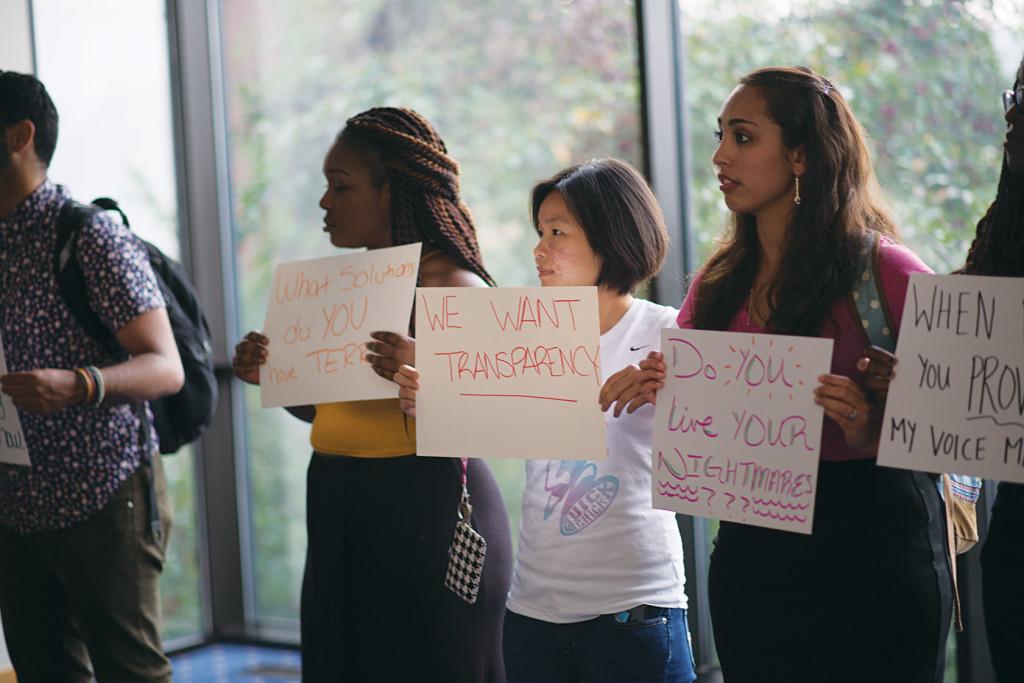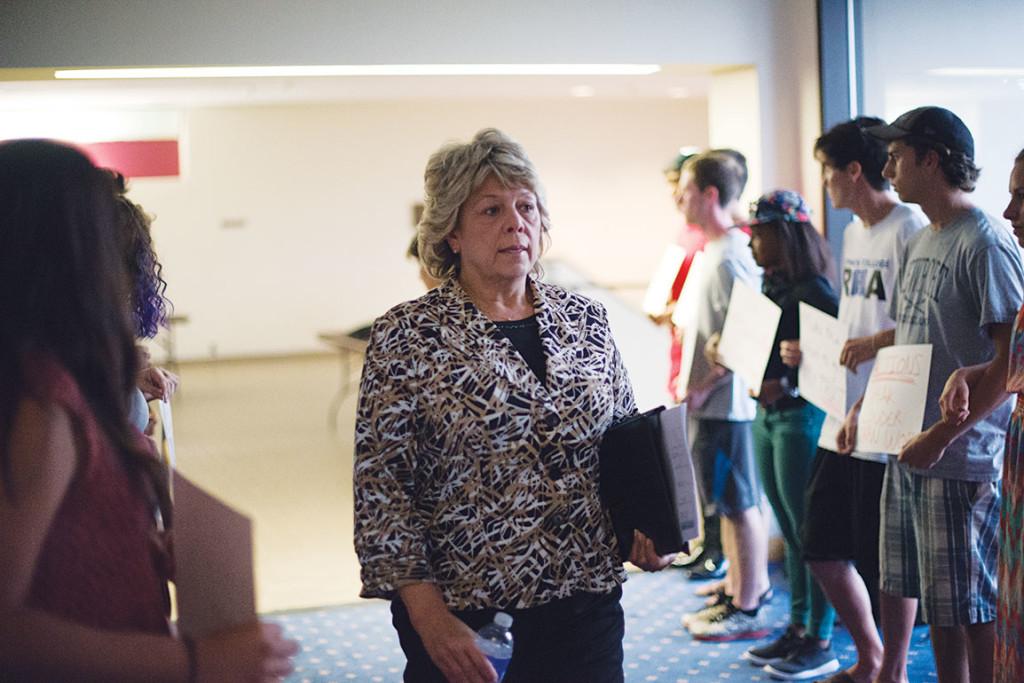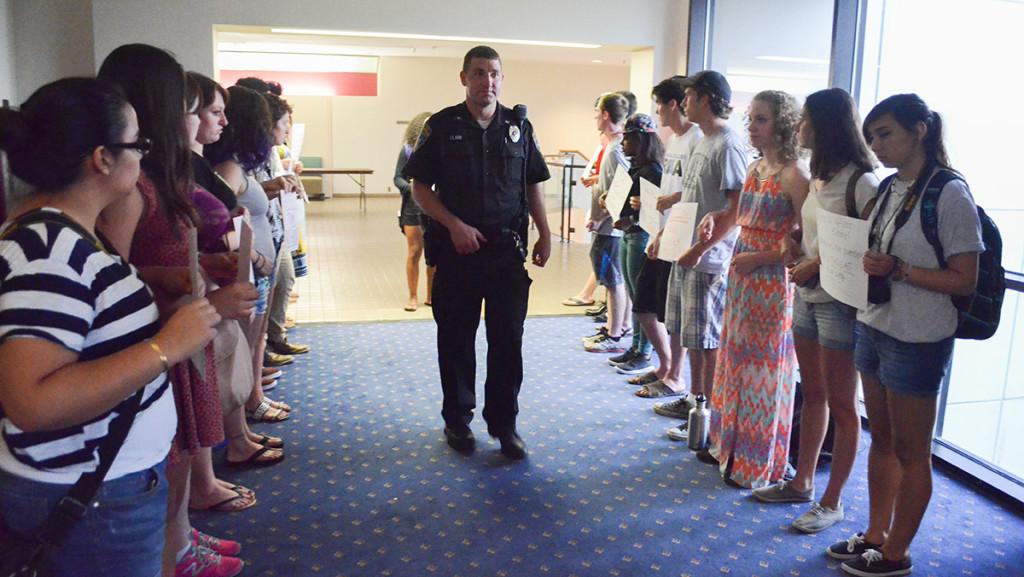Resident assistants at Ithaca College are protesting what they are calling racial profiling and harassment by Public Safety officers against students of color.
On the evening of Sept. 2, an estimated 30 resident assistants linked arms, formed two lines and silently stood on each side of the entrance to Emerson Suites. Each student held a different white sign emblazoned with a phrase protesting the actions of Public Safety officers during RA training sessions in August and the ongoing treatment of students of color on campus.
“I am not a criminal. I’m a student and also an RA.”
“When will you speak to us, not at us?”
“Do #BlackLivesMatter to Terri Stewart?”

Two Public Safety officers, Sergeant Terry O’Pray and Master Patrol Officer Jon Elmore, made comments described by RAs as “racially insensitive,” “aggressive” and “invalidating” during RA-training sessions Aug. 18. The group of RAs had asked Terri Stewart, director of the Office of Public Safety and Emergency Management, for an opportunity to address the issue directly with the two officers, but the officers have not attended subsequent meetings.
The comment from O’Pray that sparked the RA’s anger was a dismissal of an RA’s concerns about racial profiling, saying that it does not happen at Ithaca College. During a simultaneous training session, Elmore and other officers began talking about weapons and showed the RAs a black BB gun.
“[Elmore] said, ‘If I saw someone with this I would shoot them,’” RA Rita Bunatal said.
The comments made by the two officers during the sessions caused two RAs of color to walk out in anger and frustration.
An Aug. 25 meeting was planned by Stewart and Bonnie Prunty, director of the Office of Residential LIfe, between Public Safety and the Residential Life staff in an attempt to help reconcile the relationship between the two — a meeting that a group of RAs were dissatisfied with.
The RAs believe not having the officers present in that follow-up meeting demonstrates how the college is not addressing the issue of the treatment of students of color on the college campus. Multiple RAs who are also students of color said they are afraid to call Public Safety, even though it’s often part of their job. The protesters also spoke to The Ithacan about experiences dealing with racially insensitive Public Safety officers as well as officers whom they believe profile students of color.
An estimated 30 RAs at the Sept. 2 meeting staged a silent protest, refusing to have a conversation with Public Safety until that conversation includes all Public Safety officers, including O’Pray and Elmore, Bunatal said.
Prunty said this meeting was supposed to be focused on the RAs who want direct-action steps moving forward between Public Safety and RAs, not those who want to address O’Pray directly.
Junior Taranjit Singh said none of the RAs who are upset about Public Safety’s comments are looking for direct-action steps before they address O’Pray.
Public Safety is retaining the services of outside consulting firm Training for Change to facilitate direct conversations between RAs and Public Safety officers, but those discussions haven’t been scheduled yet, Stewart said.
Initial Confrontation
At the Aug. 18 training, Ithaca College RAs were in two separate sessions led by Public Safety officers: one training RAs about what to do if there was an active shooter at the college, the other talking about drugs and weapons on campus.
During the active shooter training, Singh said O’Pray mentioned ISIS and the stereotypical appearances of Muslims but didn’t say that most individuals who commit mass casualty shootings are white males. Singh said this omission, along with the fact that O’Pray didn’t mention the violence of campus police officers against students of color, caused him to speak up.
“I posed this question … ‘Most of the campus violence that does occur in America is between the campus police and students, specifically students of color,’” Singh said. “‘With recently the Cincinnati incident where the campus police officer shot the black student (sic) … what does that mean here on campus? What are we doing here on campus to address that in terms of diversity training?’”
Singh was referring to the death of Sam DuBose, who was unarmed when he was killed by University of Cincinnati police officer Ray Tensing during a traffic stop. Tensing was charged with the murder of the 43-year-old DuBose July 29. The response from O’Pray was not what Singh had hoped for.
“He took it very personally and basically denied that things like this happen on campus,” he said. “He denied that things like racially profiling exist here.”
Singh said the officer then alluded to the arrest of Sandra Bland, a woman who was found dead in jail after she was arrested for allegedly assaulting an officer during a July 10 traffic stop and not using a turn signal, when he said, “Everytime someone doesn’t turn on a turn signal, I pull them over.”
Singh said he then brought up to the officer that students of color at the college had video and audio recordings of aggressive Public Safety officers.
“‘You saying that things like that don’t occur on this campus are blatant white privilege and ignorance,’” Singh said he told O’Pray. “There’s a disconnect between campus and students of color on campus, and until we address that, we won’t be able to move forward.”
Singh said O’Pray responded “very aggressively” and said toward the end he himself got aggressive as well.
Singh was then pulled out by Megan Williams, West Tower residence director.
At the same time during the active shooter response session, Bunatal was sitting in the other session about drugs and weapons on campus.
Bunatal said initially the “cocky” demeanor of Patrol Officer Jon Elmore made her upset.
Bunatal said Elmore’s comments about shooting someone for having a BB gun made her angry. Specifically, she related it to the police’s killing of Tamir Rice, a 12-year-old boy who was shot while carrying a black BB gun in November 2014.
“Even if we don’t want to know what is going on with Black Lives Matter or the movement or just with police killings of black bodies, you still shouldn’t say something like that,” she said.
Bunatal said as the session neared its end, she began speaking to her friend and fellow RA, Yaw Aidoo. Bunatal and Aidoo both said they were emotionally triggered by Elmore’s comments and walked out of the session.
Singh filed a formal complaint against O’Pray, which is currently being investigated by the Office of Human Resources. However, O’Pray is not on leave. No formal complaint has been filed against Elmore.
Comments at the training sessions had a triggering effect due to the experiences of Bunatal, Aidoo and Singh with Public Safety. Their experiences, coupled with the stories from students they have heard, made the Public Safety officers’ unwillingness to recognize racial profiling on campus particularly jarring for them.
Singh said the relationship with Public Safety and students of color is often adversarial.
“In the most basic sense, that disconnect and distrust is there with racial profiling and things like that,” Singh said. “Certain folks are quickly pulled to the side.”
Bunatal said speaking with Public Safety worries her.
“When I see Public Safety — when I interact with officers — I get apprehensive,” Bunatal said. “I get very nervous. Yes, it’s protocol to call Public Safety, but I have to think twice about it.”
Part of this apprehension is caused by an experience Bunatal had in February.
February Incident
On Feb. 2, one of Bunatal’s residents informed her of being racially slurred in an elevator.
Bunatal said her resident, a black woman, was in the West Tower elevator when two white, male students walked in.
The male students were using the N-word in their conversation, which made the resident uncomfortable.
As she left the elevator, she said, “Stupid white boys.”
One of them responded, “Fucking black bitch.”
Bunatal called the RA of the floor on which the men lived and said the RA quickly got a confession from one of his residents.
The female resident told Bunatal she was uncomfortable with calling Public Safety herself. Bunatal then enlisted the support of Singh and Aidoo to help with talking to Public Safety about the incident.
When Patrol Officer Eric Willman arrived, he told the resident and the three RAs that no action could be taken without also implicating the female resident as well.
An audio recording of the conversation provided by Bunatal includes a man identified as Willman saying that because the men’s use of the N-word wasn’t directed toward her, the resident couldn’t respond without also risking being judicially referred.
Aidoo said the officer was equating the comments made by the female resident to the use of racial and sexist slurs made by the male students.
“You cannot compare ‘stupid white boy’ to the comments made by them,” Aidoo said.
Bunatal said the incident was an example of Public Safety officers not being prepared to handle racial incidents, and Singh said the officer’s actions condoned the linguistic violence from the male students.

Public Safety’s Response
Stewart said Public Safety officers receive ongoing diversity training as part of the college’s nondiscrimination policy.
“I’ll reference our recent training, which is, we exercise fair and impartial policing, and that’s where we train,” she said. “And that training really gets down to the science of everyone’s having bias — everyone holds bias. Our job is to provide training for our officers to be able to, one, be aware or acknowledge and, two, take action and be motivated to counteract … explicit and implicit bias.”
O’Pray’s and Elmore’s comments caused Stewart to plan the Aug. 25 meeting between Public Safety and RAs. Stewart wasn’t present for the comments made by the officers, so the meeting was in part to hear the details from the RAs.
“In short, we were trying to figure out what happened,” Stewart said. “It was very clear to us that there was an exchange or exchanges between public-safety trainers and our residential aids that left our students feeling invalidated and unsupported.”
Sophomore RA Anissa Ash said the meeting was supposed to address the initial conflicts between Singh and O’Pray, as well as Elmore’s comments, but the meeting did little to that effect.
“Not once in that meeting did we discuss race, did we discuss what happened between Taranjit and Officer O’Pray, and Officer O’Pray himself wasn’t present,” Ash said.
Stewart said at the forum, Public Safety tried to share information about themselves, including their training, but it did not go well.
“I don’t think the students were at a place where they were ready to hear that at the time, but I do think there is a place for education,” she said. “I think there’s an opportunity. Right now we’re working on the situation we have at hand, but it’s really clear to me there’s an opportunity to provide education and awareness around who we are and what we do.”
Bunatal said the meeting “skirted around the issue” and called it a “white-washed event.”
“I was absolutely furious,” Bunatal said. “My heart started racing. I wasn’t even doing anything, but my heart was racing — I couldn’t even hear.”
Toward the end of the forum, Bunatal decided to speak up after stepping outside of the meeting with Singh.
“I don’t talk from my ass. I’m talking from actual experiences that I’ve had on this campus,” Bunatal said. “Some of you have the audacity to say you feel comfortable calling Public Safety or that we should put ourselves in the position of Public Safety officers, when I don’t. … Basically, you’re silencing the stories of other people of color who have had other experiences with Public Safety officers.”
Stewart said the event was a failure.
“It further left our students feeling like they had questions that needed to be addressed,” Stewart said. “I accept responsibility for part of that, for people still leaving … It was a failed attempt.”
Following that came an apology from Stewart, Rory Rothman, associate provost for student life, and Roger Richardson, associate provost for diversity, inclusion and engagement, at each of the first-year RA building staff meetings.
“The purpose was that to acknowledge and to apologize for the series of events, including that Tuesday night forum,” Stewart said. “And to really reassure students that we are committed to resolving this and moving forward.”
Ash said she felt the apology was canned.
“It felt more like another quick fix instead of addressing the issue,” Ash said.
The RAs then began to plan their protest for the Sept. 2 meeting.
Also in attendance at the meeting was Benjamin Rifkin, provost and vice president for educational affairs, who provided The Ithacan with a statement regarding the RAs Sept. 1.
“In the past year there has been increased attention given to centuries-old patterns of violence against people of color in our country,” he said in the statement. “It is certainly understandable that Ithaca College community members, especially people of color, women and individuals who identify as LGBTQ, have concerns about their own sense of safety in this larger context. Indeed, recent events on our campus focus our concerns on disrespect here at Ithaca College: much to my dismay, at a recent meeting of Resident Assistants, I heard from a number of people of color that they do not feel safe on our campus. I affirm the college’s expectation that all members of our community, especially our Public Safety officers, are to treat others with respect and compassion.”
Sept. 2 Protest
As the RAs held their signs in silence, staff members from Residential Life and Public Safety filed into the Emerson Suites. A couple of the staff members slowly walked through the tunnel the RAs formed, reading each sign. Most quickly walked by and into the closed meeting.
“They power-walked by,” Singh said. “All the campus police officers, Provost Rifkin, Terri Stewart, especially, power-walked straight through, uncomfortable as fuck.”
As the meeting’s scheduled start time approached, the protesters gathered and walked inside the meeting room as a group.
The protesters stood on the periphery of the room, surrounding staff members from Residential Life and Public Safety who were sitting at a set of round tables. Among those sitting were Rifkin, Stewart, Prunty and a handful of Public Safety officers.
A Residential Life employee then closed the doors to the meeting. No reporters or photographers were allowed inside.
Behind the closed doors, Singh said, the protesters stood in silence looking at those who were sitting.
Singh said Richardson broke the silence and began addressing the protestors.
RA Ava Bryan said Richardson said protesting was outside the “classroom experience” that was planned for the meeting.
Singh said he thought Richardson shifted the accountability onto the RAs and away from Public Safety officers.
Bryan said the RAs’ needs haven’t been addressed in their meetings with Public Safety.
“All we really have done is asked for our experiences to be validated, and that still has not happened,” she said.
None of the RAs who surrounded the room in silence with their signs were talked to or addressed by any of the staff members who were sitting.
Bryan said the meeting was over for her when Stewart walked past without looking at the protesters.
At 7:26 p.m., the protesting RAs walked out of the meeting after Richardson announced that small-group discussions were going to begin.
“At that point, I realized this was another bullshit thing that they were doing,” Singh said. “I won’t have time to say the same thing over and over and over again. … To tell you the same solutions over and over and over again. And for you to do the same thing like it’s a call to progress, but it’s not. How many times do we have to tell you the same exact thing.”
Correction: This story previously said the February Incident took place in an East Tower elevator and that it involved three white males. The event took place in a West Tower elevator and only involved two white males. We regret the error.








